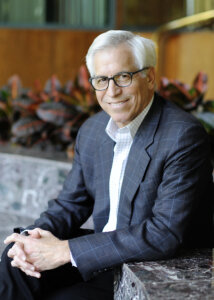A Word, Yossi Beilin, From An Old Friend
Yossi, last week you published an opinion article on this page defending the legacy of Jimmy Carter and his book “Palestine: Peace Not Apartheid” (“Carter Is No More Critical of Israel Than Israelis Themselves”). As one of the 15 councilors who resigned last week from the board of the Carter Center — and as an old friend of yours — I feel I must take you to task for defending both the book and the man.
Yossi, you and I have been friends for eight years. We have been to each other’s homes, and I have supported your peace efforts both materially and spiritually. I have often argued with other Jews in the United States and Israel, trying to persuade them to take your views more seriously. When I sent our letter of resignation to the Carter Center last week, I wondered to myself what you might think of it.
But truth be told, I wasn’t completely surprised to read your description of Carter’s book as an “impassioned personal narrative” and “a stark warning to both Israelis and Palestinians.”
I wasn’t surprised, but I was saddened. Saddened that you defended Carter’s book, despite its offering a far-from-unequivocal condemnation of Palestinian terrorism; saddened that you seem to have taken up for a person who can’t keep his stories straight.
The Israeli left is still suffering from its inability to cut off ties with Yasser Arafat after he had clearly demonstrated his lack of interest in suppressing terrorism and returned to the criminal habits that consumed his past. After the second intifada broke out in 2000, most of us came to understand the essence of Arafat and what he was about. Those on the Israeli left were among the few to still buy his disclaimers to the contrary.
More troubling still, Yossi, is your disregarding the encouragement Carter’s book may give to the hate groups that populate the landscape in America and patiently await their opportunity to marginalize the Jewish community here.
In your book “My Brothers Keeper,” you eloquently wrote about the relationship between Israel and Diaspora Jews, primarily those of us here in America. One of your central themes was that both communities often misunderstand each other’s points of communal interest. You have aptly proven your hypothesis by failing to appreciate just how sensitive many American Jews are to this critical issue.
When Carter says that there is “tremendous intimidation in our country that has silenced” the media, or when he says that “there cannot be an open and honest discussion in this country on our policies in the Middle East,” the Web sites of various hate groups here rabidly endorse the former president’s words. For many American Jews, that is cause for worry.
But Yossi, what pains me most is that you seem to have chosen to ignore Carter’s attack on your own credibility. I have seen him claim in numerous media appearances that Israel is the only stumbling block to peace. When questioned about the tremendous conciliation Israel showed in accepting President Clinton’s peace package in 2000, Carter proceeds to falsely assert that Israel never accepted the peace plan forwarded by Clinton.
Yossi, you should know better. You were Israel’s justice minister at the time, and your Cabinet voted on December 27, 2000, to do exactly what Carter claims you didn’t do: vote to accept Clinton’s plan.
At what point, Yossi, do words and actions finally resonate with you? When do you finally come to accept a person’s writings and public musings — even if contradicted by subsequent clarifications and elaborations — as the sum of their parts?
Three years ago I flew to Switzerland to show my support for you and your fellow authors of the Geneva peace accord. I remember how proud I was of your tremendous accomplishment, and of my fellow Georgian Jimmy Carter. He was the featured speaker at the ceremony, and spoke eloquently when he said that the only alternative to your Geneva plan was sustained violence.
Unfortunately, it now appears that Carter has the impression that the violence has mostly been initiated by Israelis and that Palestinians have played little role in creating the mess we are all in. This departure from broker to advocate, I am afraid, can only encourage Hamas rejectionists and prolong the violence.
On this page last week, you looked back to Carter’s Camp David summit and all that it has done for the region — and then went on to give the man a free pass to selectively interpret history. Why, Yossi, are you unable to see this person in full? Is it the cultural gap between America and Israel? Is it the loss of yet another icon of the political left to moral relativism?
Jimmy Carter has attacked Israel and our people, Yossi, and you would be wise not to embrace the man. If you do so, you will only further alienate the already weakened Israeli left from American Jewry and from the voting public in Israel — and the five Knesset seats your Meretz-Yahad Party currently holds may in the future look like a bounty.
Steve Berman, a commercial real estate developer in Atlanta, was one of 15 councilors who resigned last week from the board of the Carter Center.

















